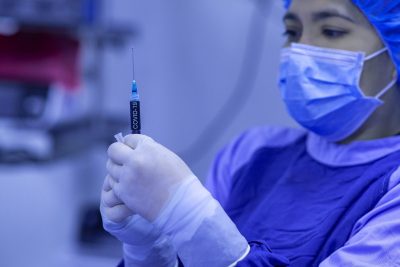
By Madison Mercado and Madhri Yehiya
Massachusetts residents aged 75 and older can begin receiving the COVID-19 vaccine Monday, as the state shifts into Phase Two of its vaccination rollout plan.
Individuals 65 and older are the second priority group, as well as those with two or more underlying health conditions.
The Commonwealth has the capacity to administer 242,000 doses of the vaccine weekly at 103 public vaccination sites, according to the Massachusetts Department of Public Health.
As the state moves further along the vaccination plan, there is still a learning curve when it comes to logistics, said Paul Beninger, associate professor of public health and community medicine at Tufts University.
He said that the local, state and federal administrations have had difficulties with vaccine dissemination.
“It’s been disappointing that all the different groups have struggled actually to try and get a proper rollout of the vaccine,” Beninger said. “They understand the concept, but the actual practice, it’s like practicing anything, you’ve got to do it.”
He said the Massachusetts inoculation plan has the right intent and is well-resourced.
Laura Corlin, assistant professor of public health and community medicine at Tufts, said the state is likely to improve its rollout with each successful week, targeting areas of the program that need the most help.
“They’re prioritizing both the mass vaccination sites but also community sites, particularly in places that have been hit hardest, which is good,” Corlin said.
Beninger said a phased rollout is essential in guaranteeing vaccinations are distributed to the most at-risk individuals.
Even if the state’s plan is imperfect, he said, it should not be abandoned for a first-come, first-serve model.
“If you try for a short while and say, ‘Well, this isn’t working, let’s try something else,’ and then [decide] to open it up and then sort of have a free-for-all for everybody who wants it,” Beninger said, “what you’re doing is disenfranchising the people who are at higher risk.”
Haeok Lee, professor of nursing at University of Massachusetts Boston, said it will be difficult for racial minority groups to get a vaccine due to a historic distrust in the health care system and continued societal barriers.
Lee said her own experience with registering her 86-year-old mother for the vaccine made her realize the U.S. health care system lacks accessibility to many elderly Americans, especially in minority groups.
She said she was able to schedule the vaccination because she’s familiar with the health care system and can read, speak and write English. But, her experience is not universal for fellow Korean Americans, who she found had difficulty registering for the vaccination.
“I really see some serious equity issues to access,” Lee said. “Because our vaccination through the health care system is really for [the] mainstream population.”
The rollout plan also does not address the language barrier, which can hold people back from easily getting vaccinated, Lee said.
“I did not see that the plan is to really reflect and tailor to [the] minority population,” Lee said.
She suggested a community-based approach where the state and medical providers reach minority and immigrant communities places where they already visit — for example, churches and community senior associations — to help educate them on the vaccine.
“We really have to reach out, rather than waiting,” Lee said. “They do not know how to use the system.”
Corlin said the state should work with community leaders to educate the general population.
“It’s really important to answer people’s questions as they have them and to make sure that our community leaders are provided good information so that messaging can come from trusted community partners,” Corlin said.
Lee added public education is important, but should not be the only goal of vaccine accessibility expansion.
“We have to really develop infrastructure to reduce barriers, particularly for minority elders,” she said, “particularly immigrants who are not able to use [the] American health care system.”
























































































































